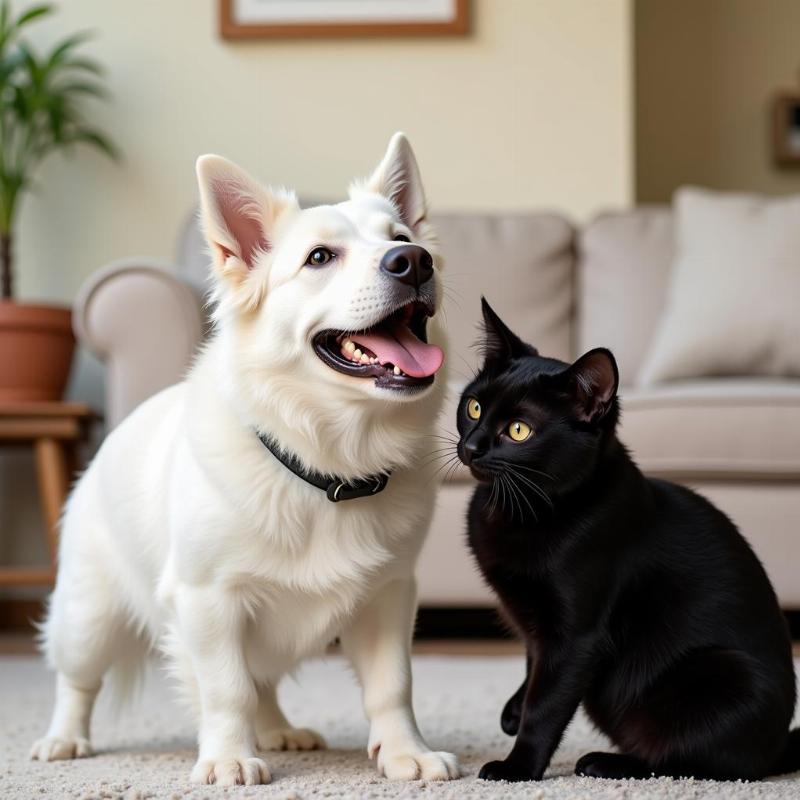The phrase “white dog black cat menu” is intriguing, isn’t it? Many pet owners, especially those new to the scene, might be puzzled by this seemingly nonsensical combination. While it doesn’t directly refer to a specific dog breed or cat food brand, it speaks to a broader concept in pet care: providing a balanced and appropriate diet for your furry companions, regardless of their color. Let’s delve into what truly matters when choosing food for your white dog or black cat.
Nourishing Your White Dog: Beyond the Coat Color
A dog’s coat color, whether white, black, or brindle, has little bearing on its dietary needs. What truly matters is the dog’s breed, age, activity level, and overall health. A small, sedentary Chihuahua will have vastly different nutritional requirements than an energetic Siberian Husky.
- Breed-Specific Needs: Certain breeds are predisposed to specific health issues. For instance, large breeds like Great Danes are prone to hip dysplasia, and their diet should include supplements supporting joint health. Similarly, Dalmatians, often known for their striking white coats, have unique urinary tract considerations.
- Life Stage Nutrition: Puppies require food rich in protein and calcium for growth, while senior dogs benefit from formulas that support joint health and cognitive function.
- Activity Level: A highly active working dog will need more calories and higher protein content than a couch potato pup.
Feeding Your Black Cat: Myths and Realities
Just like with dogs, a cat’s coat color doesn’t dictate its dietary needs. Black cats, white cats, tabby cats – they all require a diet rich in animal protein, taurine, and essential fatty acids.
- Taurine Deficiency: Taurine is an essential amino acid that cats cannot produce on their own. A deficiency can lead to serious health problems, including blindness and heart disease. Ensure your cat food contains adequate taurine.
- Hydration Matters: Cats are notoriously poor drinkers, and dehydration can lead to urinary tract issues. Consider incorporating wet food into their diet to increase their water intake.
Decoding the “Menu”: Focusing on Quality Ingredients
The essence of the “white dog black cat menu” lies in recognizing the importance of a balanced, species-appropriate diet, regardless of your pet’s appearance. Look for high-quality ingredients, avoid fillers and artificial additives, and consult with your veterinarian to determine the best diet for your individual pet.
- Reading Pet Food Labels: Become familiar with pet food labels. The first ingredient should always be a named meat source. Avoid foods with vague ingredients like “meat by-products” or “animal digest.”
- Consulting Your Veterinarian: Your veterinarian is the best resource for determining the ideal diet for your pet. They can recommend foods based on your pet’s specific needs and health conditions.
Beyond the Bowl: A Holistic Approach to Pet Wellness
Nutrition is just one piece of the puzzle. A truly happy and healthy pet requires exercise, mental stimulation, regular veterinary care, and a lot of love.
 A White Dog and Black Cat Playing Together
A White Dog and Black Cat Playing Together
Conclusion: Prioritizing Your Pet’s Well-being
The “white dog black cat menu” reminds us that providing the best possible care for our pets goes beyond superficial characteristics. By focusing on their individual needs and providing a balanced, nutritious diet, we can ensure our furry friends live long, healthy, and fulfilling lives. Remember to consult with your veterinarian for personalized advice and always choose high-quality food for your beloved companions.
FAQ:
- What is the best food for a white dog? The best food for a white dog depends on its breed, age, activity level, and any underlying health conditions. Consult your veterinarian for specific recommendations.
- Do black cats have special dietary needs? No, a cat’s coat color does not dictate its dietary needs. All cats require a diet rich in animal protein, taurine, and essential fatty acids.
- How can I tell if my pet food is high-quality? Look for a named meat source as the first ingredient. Avoid foods with fillers, artificial additives, and vague ingredient descriptions.
- How often should I feed my pet? Feeding frequency depends on your pet’s age, size, and activity level. Follow the feeding guidelines on your pet food label and consult your veterinarian.
- Why is hydration important for cats? Cats are often poor drinkers, and dehydration can contribute to urinary tract problems. Wet food can help increase their water intake.
- What is the meaning of “white dog black cat menu”? It symbolizes the importance of a balanced and appropriate diet for all pets, regardless of their appearance.
- How can I find a veterinarian near me? You can search online for veterinarians in your area or ask for recommendations from other pet owners.
Beautdogs.us is your one-stop shop for all things dog-related in the US. We offer expert advice on dog breeds, care, and products, catering to both novice and experienced dog owners. From breed-specific nutrition guides to tips on finding dog-friendly restaurants, we are your trusted source for comprehensive canine information. Contact us for personalized guidance: Email: [email protected], Phone: +1 501-555-7529. Visit Beautdogs.us for more information.